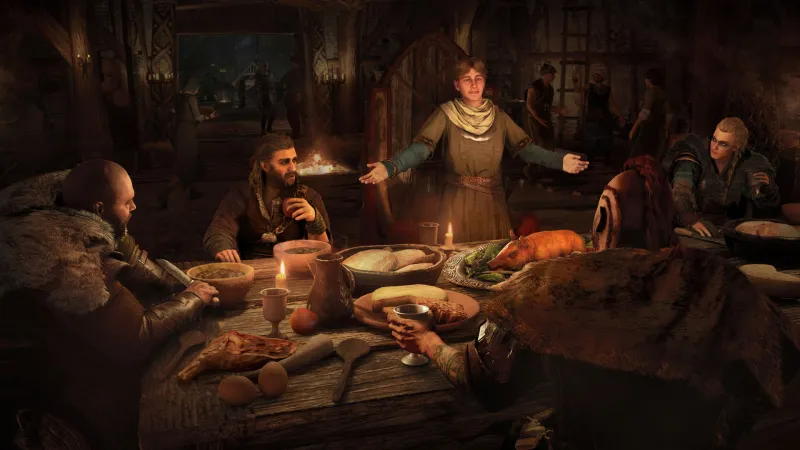


The Assassin’s Creed games are huge, in terms of both popularity and scope. Ubisoft’s hit franchise uses a mixture of history and fiction to create immersive worlds, all supported by diverse gameplay and interlocking systems. Like its predecessors, the upcoming Assassin’s Creed Valhalla is ambitious; it is an exciting dive into the lives of the Vikings, defining the iconic historical figures through war, peace, and exploration. That’s a lot of ground to cover, so we spoke to producer Julien Laferrière and narrative director Darby McDevitt to break down this massive experience and set the stage for Valhalla’s release.

Players control Eivor, a Viking hero who can be either male or female. After a prologue set in Norway, Eivor’s clan leaves their homeland to settle in England. Though Vikings are often remembered for raiding and looting, Valhalla aims to go beyond the mainstream stereotype and examine the more human stories behind the Vikings’ expansion.
“Vikings were generally known as antagonists to everyone else, but there’s a romance to them too, with the hindsight of history – just like pirates,” McDevitt says. “The story we wanted to tell is: Why did a huge group of Norse people leave Norway and go settle all over the world? They found Iceland, Greenland, they settled the Faroe Islands, Ireland, England, Normandy – all these places. It wasn’t just to rob from them. It was to settle and stay there, because they were running out of space and resources.”
“In popular culture, you think about this bearded guy with horns on a drakar, just raiding and putting fire to everything he can see,” Laferrière says. “This is really a cliché that we wanted to steer away from … Vikings were raiders, yes. Very famous warriors as well. But they were also settlers and explorers.”
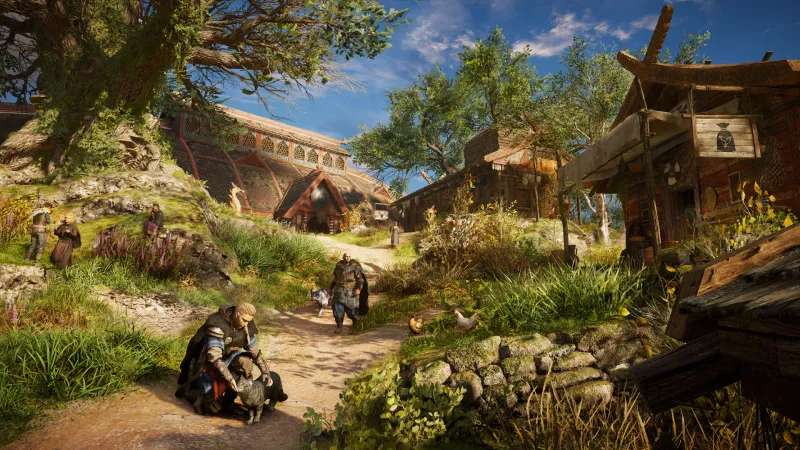
The Assassin’s Creed series has given players a place to call home in the past, like Monteriggioni in ACII and the homestead in ACIII. Valhalla goes above and beyond those efforts with Ravensthorpe, the settlement that acts as Eivor’s base of operations. This is where you initiate quests, talk to your fellow Vikings, and build new structures (like a blacksmith) to enhance your capabilities. Ravensthorpe begins as a small village, but as Eivor gains resources and friends, you expand your settlement and your influence.
“The settlement growth is tied to the pacification of England,” McDevitt says. “As you go out and come back and get alliances – and as the settlement grows – your reputation grows and people want to meet you. It’s funny, because the front half of the game, you’re going out and seeking alliances yourself. In the back half, because you have a reputation, more people are coming to you, saying ‘Hey, I heard you’re great. I’ll give you an alliance if you help me with this massive problem.’”
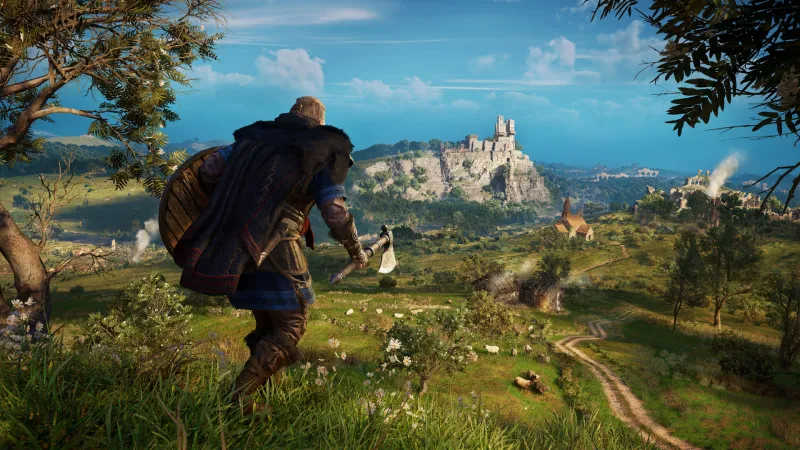
If you were to draw your path through the story in previous Assassin’s Creed installments, it would probably be a wavy line; you gradually move toward your goal, but you stray off-course for sidequests and other detours. The team thinks of Valhalla’s story structure as a flower; every quest starts and ends at the settlement, but loops out like a petal as Eivor explores new lands and seeks alliances.
“Everything starts at the heart of the game, which is the settlement,” Laferrière says. “You pledge to a given quest arc, you do that quest arc. Through that series of stories you venture into a territory of the game, meet some interesting characters, and then you come back to your settlement.” This unique approach gives the narrative an episodic feeling, since it is more about conveying the Viking fantasy than killing an archrival or chasing an Isu artifact.
“There’s not a hard plot driving you through,” McDevitt says. “There’s this series of episodes that all touch on the themes of leadership, honor, reputation, shame, betrayal. And then tucked into that is this more personal story of Eivor and prophecy. That story of prophecy is going to be more familiar as a Western story with a three-act structure, but it’s going to be threaded into this much bigger episodic story that feels more like a Norse saga.”
That isn’t to say that the narrative is unfocused. Like Odyssey, Valhalla essentially gives players three arcs to pursue. One is focused on Eivor personally, one is about the clan’s expansion, and the third involves the conflict between the Assassins and Templars – or the Hidden Ones and the Order of the Ancients, as they are known during Valhalla’s time period. Unlike Odyssey, these three plots converge eventually, rather than end independently. “There’s a certain point – a big point in the middle – where you can follow each story individually,” McDevitt says. “But they also will close in a specific order to give a different sense of conclusion.”
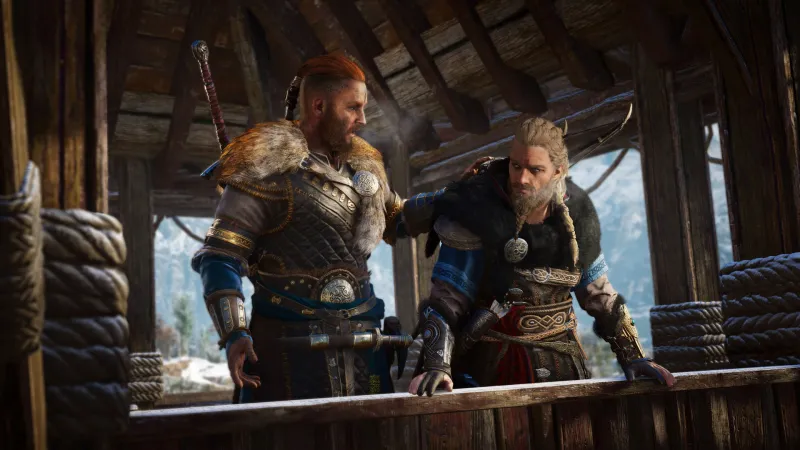
Eivor isn’t the only Viking hero. Sigurd is Eivor’s brother, the son of King Styrbjorn by blood (Eivor is adopted, but no less part of the family) and the clan’s official leader in England. When Sigurd returns home after a few years away, he is accompanied by some Hidden Ones, and this is how Eivor gets wrapped up in a conflict against the Order of the Ancients. You have a full menu (inspired by the one in Odyssey) that lists your targets from the order; taking them out helps you secure alliances in new areas, but Eivor can reap those benefits without being ideologically committed to the cause. “It’s not as black and white as, ‘I’m 100-percent enemies with the Order of the Ancients, and 100-percent friends with the Hidden Ones,’” McDevitt says. “It’s a little more juicy than that.”
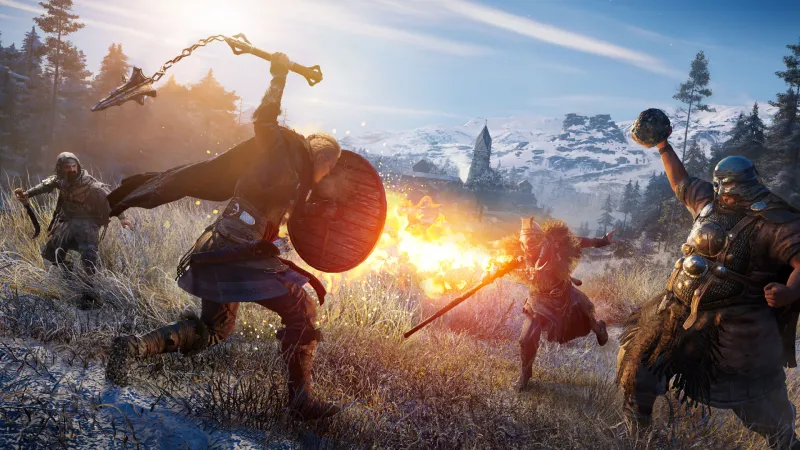
Versatility is a driving force behind Valhalla’s brutal combat. With dual-wielding and a variety of weapons like axes, bows, and the iconic hidden blade, you can pursue a fighting style that feels right for you. Plus, different abilities attached to specific pieces of gear give you even more options. For example, you might have an armor set that increases your damage output if you’re low on health, which is a high-risk approach that can result in spectacular triumph or terrible defeat. Or maybe you’d rather play it safe and strike from the shadows. “If you want to play a badass Viking who likes to fight with a two-handed axe, the game will support that,” Laferrière says. “If you want to play an assassin oriented around stealth, the game will allow you to do that … it’s a game that caters to a lot of different playstyles.”
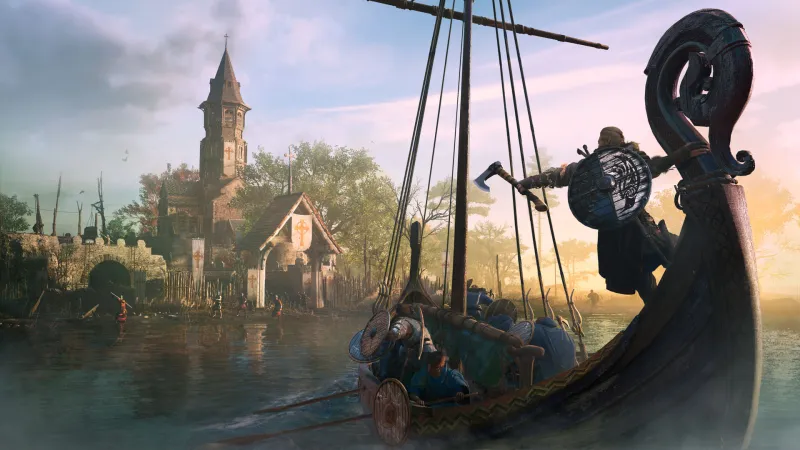
You can’t be a Viking raider without raiding, and you can’t raid without a ship. Valhalla puts Eivor in command of a ship and crew, allowing you to attack English settlements and gain resources. But formal raids aren’t the only time you can get some help from your Viking companions. “We came up with ‘raid anywhere,’ which is basically any sort of military location along the shores,” Laferrière says. “Not necessarily a ‘raid,’ per se, but you’re able to use your crew to help you out in this context.”
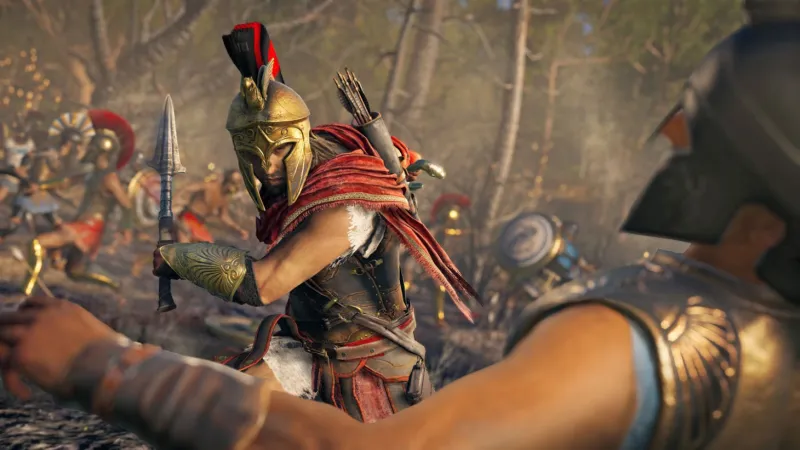
Before Valhalla, Ubisoft Montreal’s last Assassin’s Creed game was Origins. However, with Odyssey releasing in 2018, the team was also able to learn from that installment during Valhalla’s development. This includes integrating some of Odyssey’s successful innovations, like how players use skills in combat. “A good example of something Odyssey brought is all the abilities you can equip,” Laferrière says. “That’s a super-cool thing we wanted to bring back with our own flavor and our own twist in Valhalla.”
Valhalla is also able to improve on areas where Odyssey faced some criticism. For example, Odyssey had a lot of cool legendary weapons and armor, but they could get buried amid an abundance of not-so-cool loot. “We wanted to transition from an economy that is loot-based to something more collection-based,” Laferrière says. “Vikings were taking good care of their weapons and gear, sometimes passing them down generations, so that’s something that is historically accurate. But the reason we did it isn’t only because of history. It’s mostly because of player behavior. We know that when players find a good piece of loot, they like to stick with it and upgrade it.”
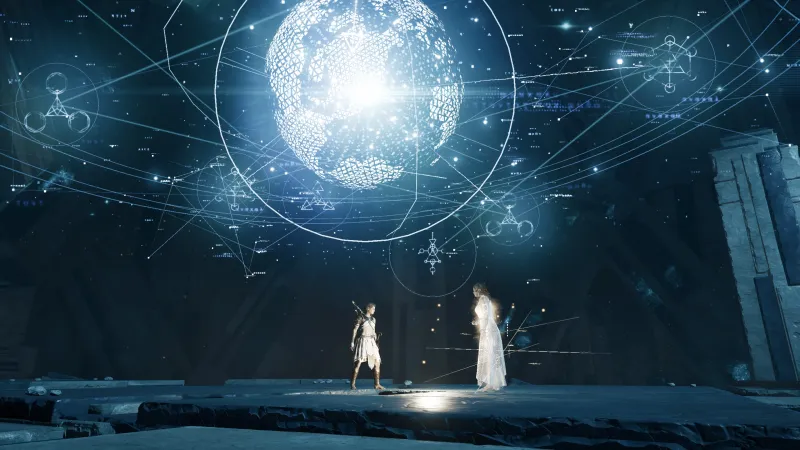
Assassin’s Creed Origins introduced a new modern-day story arc starring Layla Hassan, and Odyssey continued Layla’s quest. Valhalla is the concluding chapter of that tale. Like previous entries, some sequences have players controlling Layla outside of the Animus – but your interactions with the modern-day arc now go beyond those interludes.
“The amount of time you spend in the present day would be equivalent to [Origins and Odyssey], but with the added provision that there are these Animus anomalies in the simulation layer,” McDevitt says. “You’ll find quite a lot of them; when you find them as Eivor and touch them, the whole simulation freezes and then Layla drops the disguise. She becomes Layla in the simulation, and then you have dialogue with your present-day characters there, and you have to solve puzzles, and things like that. And they are very cool, and the rewards for them are mind-blowing. So, we found a way so you don’t have to get out of the Animus at all times to do the present-day; sometimes the present day happens in the Animus.”
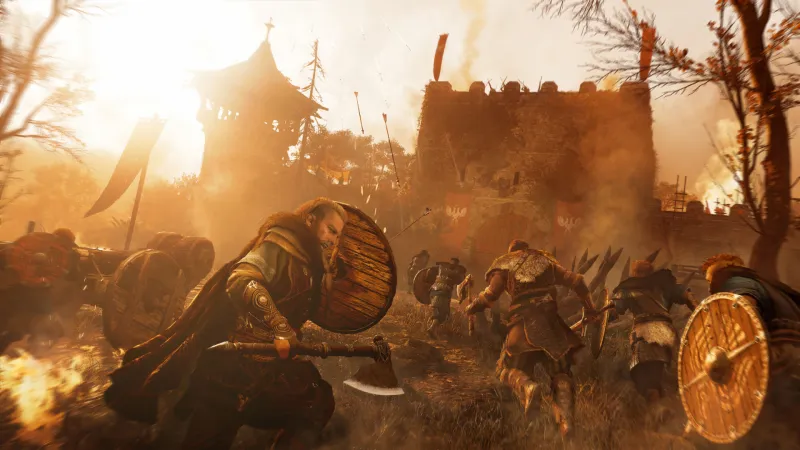
Even though Valhalla is releasing on current- and next-gen consoles, the content of the game remains the same no matter what system you play on. The big difference between the versions is technical, with the new generation offering improved visuals and performance. “I’m playing the game on the test kits that we have, and it’s definitely a cool and smooth experience,” Laferrière says. “I’m amazed by what we can get. Just think about your go-to AC game and think about the amount of loading that we have, and how much improving that can help. For example, when you use the raven in [Valhalla]. Traditionally, if the raven or eagle would go too far, you would have this loading. Now, in a normal use of your raven, you immediately go back to your character … Because next-gen has better loading capacities and so on, I feel that the immersion of the game will just be better.”

Explore your favorite games in premium print format, delivered to your door.